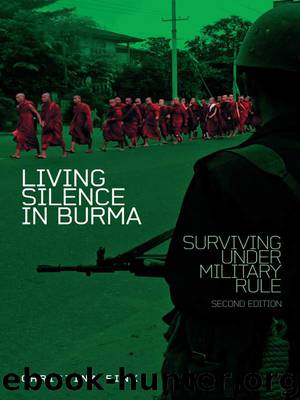Living Silence in Burma by Christina Fink

Author:Christina Fink [Fink, Christina]
Language: eng
Format: epub
Publisher: Zed Books
Published: 2013-07-04T04:00:00+00:00
Military commanders and other state authorities have implemented additional policies which have created a legacy of increased racial hatred in some areas. Policies include confiscating land which is then either given or sold to people of other ethnic groups, encouraging Burmans to move into the ethnic states, and rewarding Burman soldiers who marry non-Burmans. The intention of all these policies is to dilute the concentration of non-Burman, non-Buddhist populations and delegitimize ethnic groups’ demands for autonomy. While these policies have not been practised in all areas at all times, there are several examples.
In Northern Arakan State, the authorities have moved Rohingya populations out of many villages, and resettled Arakanese and Burman Buddhists in their place.21 In many cases, Arakanese Buddhists have supported this policy as they do not want the population of Rohingya Muslims in their state to increase. Meanwhile, with the agreement of the SPDC, between 1999 and 2001 the United Wa State Army moved between 50,000 and 126,000 Wa hill farmers from north-eastern Shan State to an area close to the Thai border.22 Forty-eight thousand Shan, Lahu and Akha villagers, who lived in an area where the Shan State Army (South) was active, were forcibly displaced to make room for the Wa settlers.23 The relocation programme was carried out because the UWSA wanted to expand its area of control while the SPDC wanted to remove support for the Shan State Army (South) and mix up the population in the area. In Northern Shan State, recent Chinese immigrants have been able to buy up land from indebted farmers, fuelling resentment at the growing Chinese presence.24 Groups such as the Shan, who found comfort in their dominant numbers locally, now risk becoming minorities even in their own districts and states.
A piecemeal process of Burmanization in the ethnic states is also taking place, as new bases are built, land is confiscated, and tatmadaw soldiers resettle their families around the bases. Over the past twenty years, there have been periodic reports of Burman soldiers in the tatmadaw being rewarded with money or a promotion if they marry Chin, Karen or Shan girls in the ethnic states.25 By mixing the blood of ethnic minority populations, future generations are likely to become Burmanized and adopt Burman-style Buddhism. The impact of these policies is to shift the balance in the composition of local populations and to create the conditions for communal strife in the future.
The threat of independent groups
Download
This site does not store any files on its server. We only index and link to content provided by other sites. Please contact the content providers to delete copyright contents if any and email us, we'll remove relevant links or contents immediately.
| Anthropology | Archaeology |
| Philosophy | Politics & Government |
| Social Sciences | Sociology |
| Women's Studies |
The Secret History by Donna Tartt(16627)
The Social Justice Warrior Handbook by Lisa De Pasquale(11489)
Thirteen Reasons Why by Jay Asher(7788)
This Is How You Lose Her by Junot Diaz(5775)
Weapons of Math Destruction by Cathy O'Neil(5038)
Zero to One by Peter Thiel(4824)
The Myth of the Strong Leader by Archie Brown(4789)
Promise Me, Dad by Joe Biden(4449)
Beartown by Fredrik Backman(4420)
Stone's Rules by Roger Stone(4417)
How Democracies Die by Steven Levitsky & Daniel Ziblatt(4399)
The Fire Next Time by James Baldwin(4343)
100 Deadly Skills by Clint Emerson(4079)
A Higher Loyalty: Truth, Lies, and Leadership by James Comey(4033)
Rise and Kill First by Ronen Bergman(4012)
The David Icke Guide to the Global Conspiracy (and how to end it) by David Icke(3883)
The Farm by Tom Rob Smith(3872)
Secrecy World by Jake Bernstein(3783)
The Doomsday Machine by Daniel Ellsberg(3731)
